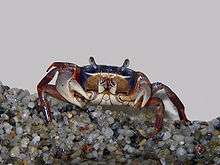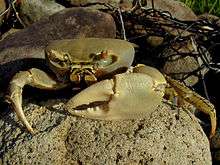Cardisoma
Cardisoma is a genus of large land crabs. Three species formerly placed in this genus are now placed in Discoplax.[1] The four species that remain in Cardisoma are found in warm coastal regions where they live in burrows. Young individuals are often very colourful with a purple-blue carapace and orange-red legs (leading to a level of popularity in the pet trade), but as they grow older the colours tend to fade, and females may be duller than males. Although less extreme than in fiddler crabs, one claw is usually considerably larger than the other. They are omnivores, but primarily feed on plant material.[2]
| Cardisoma | |
|---|---|
| Cardisoma carnifex | |
| Scientific classification | |
| Kingdom: | |
| Phylum: | |
| Subphylum: | |
| Class: | |
| Order: | |
| Infraorder: | |
| Family: | |
| Genus: | Cardisoma Latreille, 1828 |
| Type species | |
| Cardisoma guanhumi Latreille, 1828 | |
Species
The genus Cardisoma comprises these four species:[1]
| Image | Name | Common name | Distribution |
|---|---|---|---|
 | Cardisoma armatum Herklots, 1851 | (African) rainbow crab, (Nigerian) moon crab or patriot crab | east Atlantic coastal regions |
| Cardisoma carnifex (Herbst, 1794) | red-claw crab | Indo-Pacific coastal regions | |
 | Cardisoma crassum Smith, 1870 | mouthless crab | east Pacific coastal regions |
 | Cardisoma guanhumi Latreille, 1825 | blue land crab or giant land crab | west Atlantic coastal regions |
gollark: My software is so quirky and fun.
gollark: Oh, right, it won't let you make a key with no channels because that means every channel, which you don't have perms for.
gollark: Why do you even have lasers access?
gollark: No I didn't.
gollark: You'll have to `install` again, I pushed changes.
References
- Peter K. L. Ng, Danièle Guinot & Peter J. F. Davie (2008). "Systema Brachyurorum: Part I. An annotated checklist of extant Brachyuran crabs of the world" (PDF). Raffles Bulletin of Zoology. 17: 1–286. Archived from the original (PDF) on 2011-06-06.
- Donald B. Bright & Charles L. Hogue (1972). "A synopsis of burrowing land crabs of the world and list of their arthropod symbionts and burrow associates" (PDF). Contributions in Science. 220: 1–58. Archived from the original (PDF) on 2010-10-09.
External links
This article is issued from Wikipedia. The text is licensed under Creative Commons - Attribution - Sharealike. Additional terms may apply for the media files.